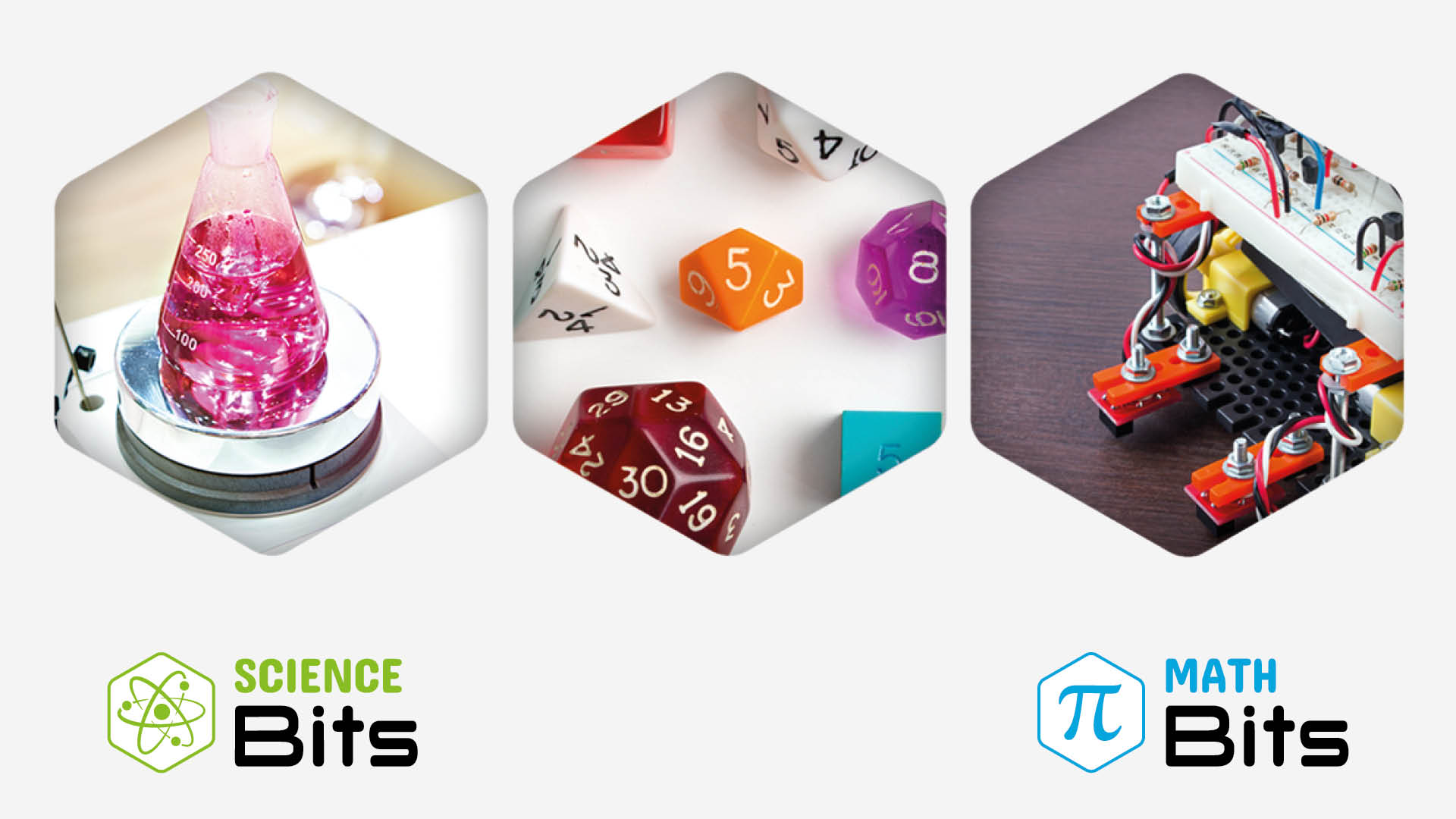
Today we are witnessing an unprecedented social and technological change on a global scale, and we are at the center of it.
The digital age has revolutionized and transformed the dynamics of our everyday life and caused radical changes in most industries and productive sectors. Education and the workplace are the areas that best reflect this paradigm shift.
New technological innovations, changes in production modes, digitalization, and globalization have laid the foundations for the emergence of the Fourth Industrial Revolution, a concept coined by Klaus Schwab, the founder of the World Economic Forum.
The current scenario moves past outdated industrial and post-industrial logics to focus on the need to train new generations in the scientific and technical knowledge that is the basis of many of today’s careers and, especially, tomorrow’s. Thus, STEM (an acronym for Science, Technology, Engineering, and Mathematics) career profiles are the most sought after today and are intended to meet the needs of contemporary society.
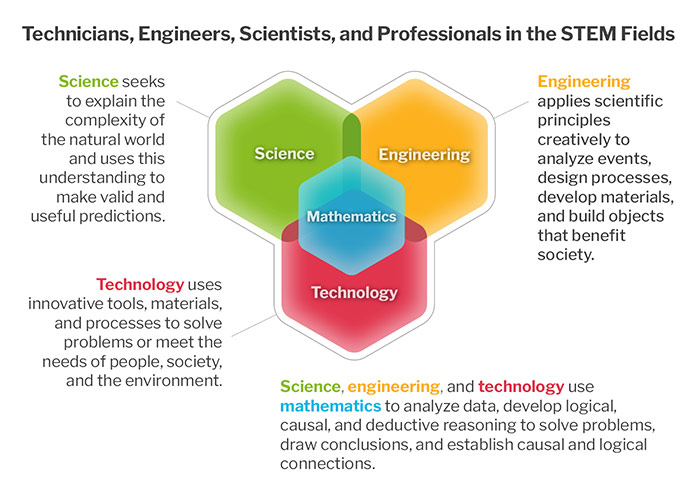
SOURCE: based on data from the Massachusetts Department of Elementary and Secondary Education, 2016.
Skills Development and Responsibility
Investing in a quality education in these four great areas of knowledge means promoting the development of skills, quality in employment, and instilling a sense of responsibility in the professionals who will lead our future and face the new challenges that it poses.
It’s not about providing knowledge related to a specific field or job position but to shape a career profile that is flexible, solution-focused, and motivated and that adapts to an ever evolving context. The solution lies in prioritizing analytical thinking, active learning, and other skills embedded in the educational methods applied by STEM careers.
The STEM fields are wide and varied, including:
The Importance of STEM in Education
The impact of the current global health crisis has only reinforced the idea that the world is reinventing itself. Both new technologies and the huge volume of data managed worldwide are growing exponentially. Compared to twenty years ago, the internet has changed radically. Today we consume technological products and services in huge amounts and technology has helped us to automate processes that were originally executed manually.
Universities, which are always aware of and permeable to the needs of our digitalized society, are promoting STEM-like careers more and more as they become more compatible with technological evolution. A study by the Organization for Economic Cooperation and Development (OECD) predicts that many of the jobs in highest demand today will disappear by 2030 and be replaced by jobs directly or indirectly related to the STEM fields (a very likely prediction if we consider that in 2013 there were 1.2 million STEM jobs to be filled and demand for STEM professionals today has more than doubled).
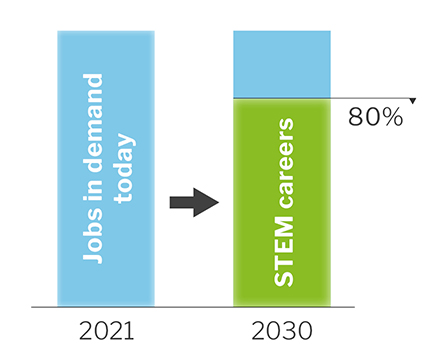
According to the Organization for Economic Cooperation and Development (OECD), many of the most in-demand jobs today will disappear by 2030.
Promoting STEM Careers to Make the World a Better Place
The aim of the International Science Teaching Foundation (ISTF) is to further contribute to the development of high-quality education around the world. We promote the search for tools that can help transform the way in which scientific and technology subjects are taught, with the aim of boosting student interest in science.
We strongly believe in driving others to do things that motivate them so that together we can create a future in which professionals, companies, the economy, and the world build an advanced, intelligent, and caring society.
We believe that education is the key tool that allows us to advance as a society and as individuals. New instructional methodologies play a prominent role in promoting the pursuit of excellence in education and fostering good practices and interest in research, which are key factors in the development and growth of science.
Science Bits: A Project by the ISTF
As a Foundation, we have created a project linked to natural sciences: Science Bits.
The goal of this project is two-fold: to provide teachers with the necessary tools to promote a quality scientific and technological education and stimulate students to learn science, while allowing them to reflect on the importance of these fields in their lives. The Science Bits proposal is a key step in the direction of integrated teaching and learning in the STEM fields.
Science Bits has firmly established itself in the education community only eight years after its launch. It is currently being used by almost 2,000 schools around the globe. The scientific approach to science teaching and learning adopted by Science Bits has won it more than 20 international awards. One such award is the Academics’ Choice Smart Book for Mind-Building Excellence, selected by a jury of academics from leading universities such as Princeton, Harvard, George Washington University, and other renowned educational institutions. Other awards include the United Nations World Summit Award, the CSIC Science in Action award (Spain’s largest public research body), the Qatar Foundation’s WISE Award, and the CODiE Award from the association for the software and digital content industries of the US.
***
Sources:

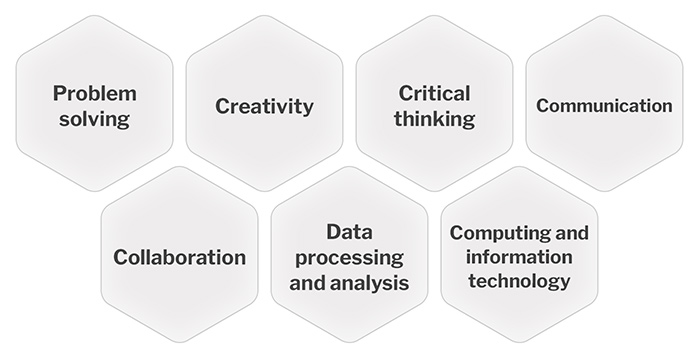
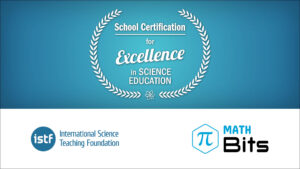








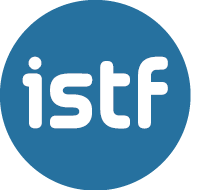
Leave a Reply